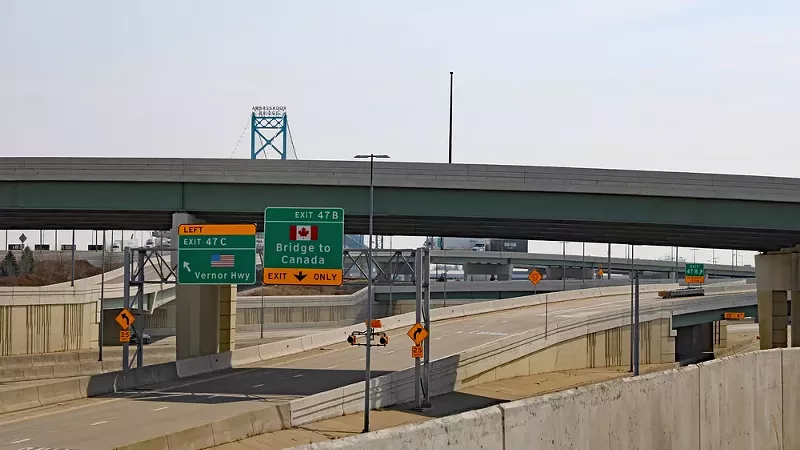Detroit Metro Times: Immigrants are ‘disappearing’ at Detroit’s Ambassador Bridge
A Venezuelan man attempted suicide after accidentally taking the wrong exit in Southwest Detroit and getting detained

Shuttershock
Immigrants are making a wrong turn at the Ambassador Bridge, and many are ending up in federal custody.
A Venezuelan man who took a wrong turn near the Ambassador Bridge in Southwest Detroit was detained by U.S. Customs and Border Protection (CBP), prompting outrage from immigrant advocates and elected officials who say the facility where he was held is being used to secretly hold families in inhumane conditions.
U.S. Rep. Rashida Tlaib, D-Detroit, joined the ACLU of Michigan and the Michigan Immigrant Rights Center (MIRC) on Thursday to demand an end to what they described as unlawful detentions and “disappearances” at CBP’s site near the U.S.-Canada border. They said many detainees have no access to legal counsel or family members and are not listed in the U.S. Immigration and Customs Enforcement (ICE) detainee locator system.
“These are our neighbors and families,” Tlaib said at a news conference. “They should not be disappearing because they make a wrong turn.”
Between Jan. 20 and March 21, CBP detained at least 213 immigrants in Detroit, according to data shared with advocates. More than 90% of them had reportedly crossed into a customs lane at the bridge or nearby tunnel – a mistake many metro Detroiters have made.
“Our neighbors and families should not be disappearing because they make a wrong turn, and we should not allow for inhumane conditions for individuals and families,” Tlaib said.
One of those detained was a Venezuelan man who attempted suicide while in custody at a CBP facility near the Detroit-Windsor tunnel in March. He was later hospitalized and transferred to an ICE detention center. His whereabouts remain unknown.
Tlaib said she visited the CBP facility near the bridge on March 21 and was alarmed by the conditions. The cells were so small, she said, she could touch both walls with her outstretched arms.
“This is an office space that isn’t equipped for long-term stays, especially for children,” Tlaib said. “People are disappearing. We don’t know where they’re at and what’s happening to them. It’s happening right in our back yard.”
In one case described by advocates, a woman and her two young children – both U.S. citizens – were detained for five days in a windowless room with little food and no access to medicine. The children became sick, and the only food available was a shared cup of ramen noodles. The family was not allowed to contact a lawyer or their consulate, according to advocates.
Ruby Robinson, managing attorney at MIRC, called CBP detention “a virtual black box,” where people are held with no public accountability.
“Every person has the right to access legal counsel in every detention setting in the United States, and that must apply to people in CBP custody,” Robinson said.
Miriam Aukerman, senior staff attorney with the ACLU of Michigan, warned that such secretive practices could lead to broader constitutional violations.
“In a democracy, there must be access to people in detention,” she said. “People don’t just vanish without someone being able to find out where they are.”
Advocates are calling for a series of reforms, including an end to the use of CBP sites for long-term detention, especially for families and children; inclusion of CBP detainees in locator systems; access to legal counsel; and congressional oversight of border detention practices.
They are also urging Congress to pass the Dignity for Detained Immigrants Act and the Access to Counsel Act, which would mandate humane treatment and legal access for detainees.
CBP has defended the facility, saying it is only used temporarily while individuals await transfer to ICE. A spokesperson told the Detroit Free Press that officers are trained to prevent self-harm and that detainees are treated with “dignity and respect.”
But advocates say the facilities often lack adequate supplies, like food, toys, and diapers for children.
“Whats happening on the northern border is intolerable,” Aukerman said. “We need to take action.”